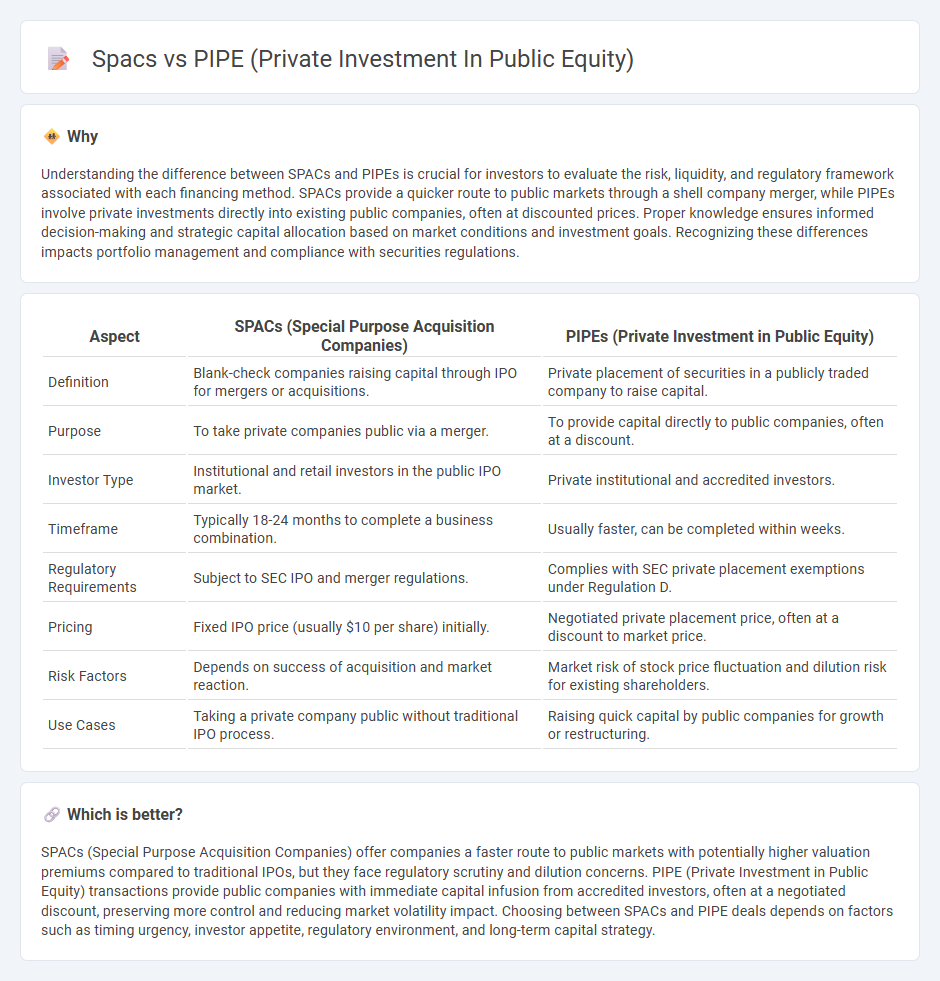
Special Purpose Acquisition Companies (SPACs) are shell companies created to raise capital through an initial public offering (IPO) for the purpose of acquiring existing private companies and taking them public, bypassing traditional IPO procedures. Private Investment in Public Equity (PIPE) involves private investors purchasing shares of publicly traded companies at a discount, providing immediate capital and liquidity. Explore the distinct financial strategies and benefits of SPACs versus PIPE investments to better understand their roles in modern capital markets.
Why it is important
Understanding the difference between SPACs and PIPEs is crucial for investors to evaluate the risk, liquidity, and regulatory framework associated with each financing method. SPACs provide a quicker route to public markets through a shell company merger, while PIPEs involve private investments directly into existing public companies, often at discounted prices. Proper knowledge ensures informed decision-making and strategic capital allocation based on market conditions and investment goals. Recognizing these differences impacts portfolio management and compliance with securities regulations.
Comparison Table
| Aspect | SPACs (Special Purpose Acquisition Companies) | PIPEs (Private Investment in Public Equity) |
|---|---|---|
| Definition | Blank-check companies raising capital through IPO for mergers or acquisitions. | Private placement of securities in a publicly traded company to raise capital. |
| Purpose | To take private companies public via a merger. | To provide capital directly to public companies, often at a discount. |
| Investor Type | Institutional and retail investors in the public IPO market. | Private institutional and accredited investors. |
| Timeframe | Typically 18-24 months to complete a business combination. | Usually faster, can be completed within weeks. |
| Regulatory Requirements | Subject to SEC IPO and merger regulations. | Complies with SEC private placement exemptions under Regulation D. |
| Pricing | Fixed IPO price (usually $10 per share) initially. | Negotiated private placement price, often at a discount to market price. |
| Risk Factors | Depends on success of acquisition and market reaction. | Market risk of stock price fluctuation and dilution risk for existing shareholders. |
| Use Cases | Taking a private company public without traditional IPO process. | Raising quick capital by public companies for growth or restructuring. |
Which is better?
SPACs (Special Purpose Acquisition Companies) offer companies a faster route to public markets with potentially higher valuation premiums compared to traditional IPOs, but they face regulatory scrutiny and dilution concerns. PIPE (Private Investment in Public Equity) transactions provide public companies with immediate capital infusion from accredited investors, often at a negotiated discount, preserving more control and reducing market volatility impact. Choosing between SPACs and PIPE deals depends on factors such as timing urgency, investor appetite, regulatory environment, and long-term capital strategy.
Connection
SPACs (Special Purpose Acquisition Companies) frequently utilize PIPE (Private Investment in Public Equity) transactions to secure additional capital necessary for merging with a target company, enhancing financing flexibility and growth potential. PIPE investors provide committed equity funding that supports the SPAC's acquisition strategy by injecting capital at or near the time of the business combination. This connection enables SPACs to efficiently raise substantial funds while offering PIPE investors discounted shares and potential upside in the post-merger public entity.
Key Terms
Dilution
PIPE transactions typically involve private investors purchasing shares of a public company at a discount, leading to controlled but potentially significant dilution due to the issuance of new shares. SPAC mergers often cause dilution through the creation of additional shares to public investors and sponsor promote shares, sometimes resulting in higher dilution compared to PIPEs. Explore how the dilution impacts shareholder value and compare strategic benefits to choose the best investment approach.
Valuation
PIPE transactions typically offer investors discounted valuations compared to the prevailing market price of a public company's shares, reflecting the risk and illiquidity involved. SPACs often involve valuation negotiations based on the target company's projected earnings and market potential, which can lead to inflated stock prices post-merger. Discover more about how these valuation dynamics shape investment strategies in PIPEs and SPACs.
Sponsor
PIPEs (Private Investment in Public Equity) involve private investors, typically institutional sponsors, directly injecting capital into a public company, offering quick funding without a traditional public offering. SPACs (Special Purpose Acquisition Companies) are sponsored by sponsors who raise capital through an IPO to acquire a private company, bringing it public while providing sponsors with significant equity stakes and potential upside. Explore the nuances of sponsor roles and incentives in PIPEs versus SPACs to better understand strategic investment impacts.
Source and External Links
Private Investment in Public Equity (PIPE) - Datasite - A PIPE is a private placement of equity securities by a public company to accredited investors, offering a quicker and cheaper way to raise capital often at a discount or with convertible preferred stock, and typically followed by a registration for resale of shares to the public shortly after the transaction.
Private investment in public equity - Wikipedia - A PIPE deal involves selling shares or preferred stock of a public company privately to selected investors without a public stock exchange offering, which can be registered with the SEC or unregistered.
PIPE Offerings - Investor.gov - PIPEs are transactions in which investors buy restricted shares from a public company at a set price with the expectation the company will file to allow resale, but these offerings can dilute existing shareholders by increasing the supply of stock in the market.
 dowidth.com
dowidth.com